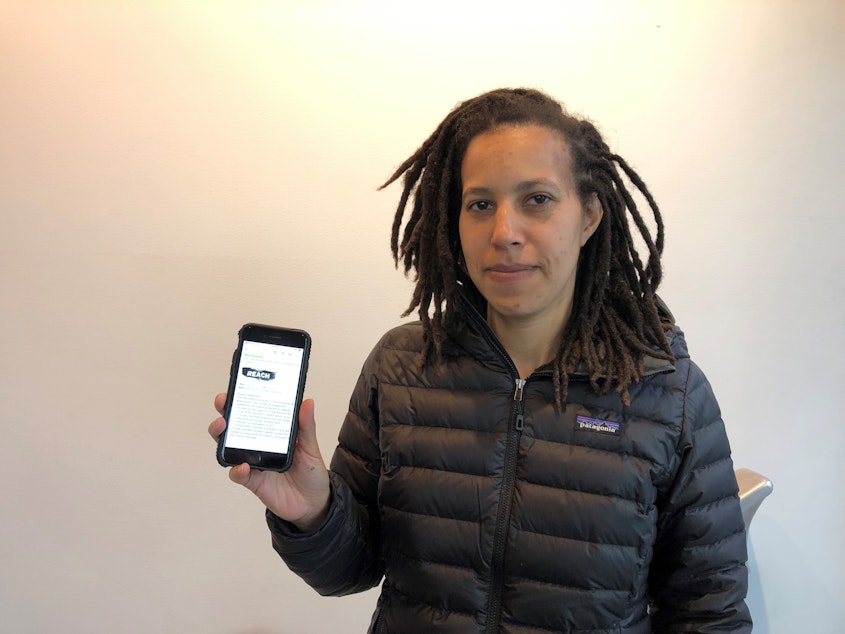Seattle's LEAD program wins accolades, but not everyone is a believer

There are glowing national endorsements for Seattle’s Law Enforcement-Assisted Diversion program, which sends low-level offenders to services rather than jail.
But one of the program's founders says LEAD is at a crossroads and needs more funding to succeed.
Meanwhile some city leaders are proposing alternatives, saying LEAD isn’t for everyone.
The program is popular among City Council candidates. In their run for Seattle City Council District 4, socialist Shaun Scott and former council staffer Alex Pedersen differ on many issues — but both endorse LEAD.
As Scott told a recent CityClub forum, “I support that measure wholeheartedly. I would also support making sure it has the money it needs.”
Pedersen responded, “The Law Enforcement Assisted Diversion Program has been studied and proven to be successful for low-level crimes….Because of that, I feel confident expanding the funding for LEAD.”
A 2015 study found that LEAD participants had a 58% lower rate of arrests than a control group and 39% lower odds of felony charges – although there was no statistically significant effect for total charges.
City Council candidates in District 7 both support LEAD, but say it’s not working for everyone.
Sponsored
Jim Pugel helped launch the program as an SPD commander, but said Seattle must still address a small group of criminal offenders who are “non-amenable to anything.”
His opponent, assistant city attorney Andrew Lewis, said some people have been engaged with LEAD for years, but continue to commit large numbers of low-level offenses. He proposes creating a municipal drug court to work with some of them.
In the current budget process, LEAD supporters are seeking $4.7 million to staff incoming referrals, and expand the program to serve new parts of Seattle and include people who are legally incompetent to stand trial due to mental health issues. Mayor Durkan’s budget proposal doesn’t include that funding, but would fund new pilot programs for “prolific offenders,” like a shelter in the jail building and “enhanced probation.” Those recommendations emerged from the High Barrier Individuals Working Group.
Municipal Court Judge Damon Shadid recently told the City Council that the court needs new options.
“If [low-level offenders] are receiving services in the community and they are responding well to that, then that is the absolute way we should be handling cases,” he said. “When they’re not responding to that, though, we do have to think about the community and community safety."
Sponsored

But Lisa Daugaard with the Public Defender Association, who helped create LEAD in 2011 and recently received a MacArthur “genius” grant for her efforts, disputes the idea that a certain percentage of people will not respond to LEAD outreach and services — if given time.
“The question about people refusing services, I mean this is sort of an urban myth,” she said.
Daugaard said she doesn’t see LEAD participants landing in court as a failure, given that many struggle with homelessness, substance use and mental health issues.
Sponsored
“Meaningfully engaging in addressing those issues does take time,” she said. “So folks are going to show up in court. And what really is optimal is to have coordination between the prosecutor's office and LEAD case managers for those individuals.”
She said right now LEAD caseworkers can’t adequately serve all the people police are referring to them.
“What the future holds for LEAD is really dependent on the budget process right now. We are at a fork in the road," Daugaard said.
Tara Moss, the LEAD project director, said LEAD only goes into neighborhoods that want it. She said West Seattle, for example, recently asked for the program.
“What’s interesting about that is those were business owners — the ‘victims’ in a way — saying, ‘We want to do a different approach and we really want to be working with you,’” she said.
Sponsored
Moss said when LEAD expanded in parts of Seattle’s North Precinct this year, they estimated they’d receive about 50 law enforcement referrals in 12 months. Instead, they’ve received 250.
Ballard resident Angie Gerrald is a member of the group Speak Out Seattle. She said the LEAD staff she’s seen at community meetings are “amazing.” But she hasn’t found good answers about the public safety benefits and outcomes of LEAD by neighborhood.
“Right now I know that they are helping individuals who are part of their program, and that’s great," she said. "But if it’s going to be sold from a political standpoint as ‘this is going to improve public safety in Seattle,’ we don’t have that information."
Gerrald said some people are unconvinced that LEAD alone will improve public safety. She said it’s crowded out discussion of alternatives like drug court and mental health court.
“A lot of the options being told to the public are that it’s ‘LEAD and diversion’, or ‘throw everyone in jail,'” she said. “You get these extremes presented and you have data from five years ago that’s used as the reason for why we have to go this one route.”
Sponsored
Gerrald said these court-based programs offer more transparency on criteria and outcomes. But Daugaard said they’re more expensive to administer.
She noted that more studies of LEAD are in the works. King County’s Behavioral Health and Recovery Division is evaluating LEAD’s expansion to people “with significant mental health needs” and in to Burien.
Results will be shared in early 2020.
And Daugaard is working on a study with the UW’s Evans School to examine the community impact in Burien if everyone who is eligible for LEAD is enrolled in the program. That could hold answers for Seattle as well.
Stay in the know by subscribing to KUOW's Election Newsletter. Each week, we'll send you updates on stories to watch and news not to miss. Sign up at kuow.org/elections.




